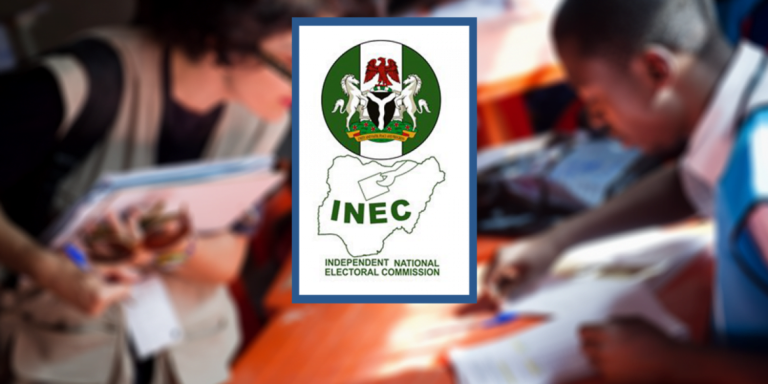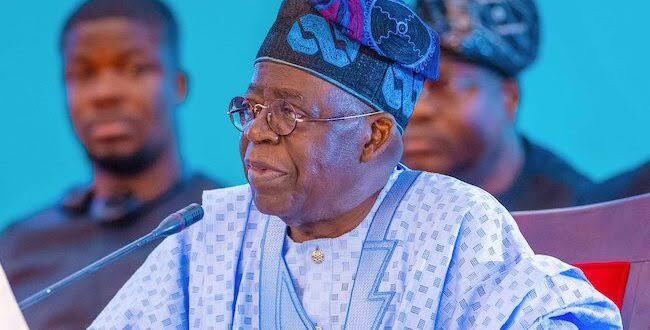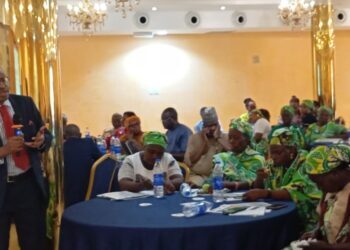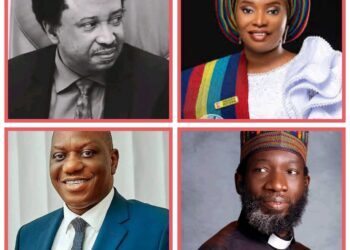This illustration photograph shows a screen displaying a stock market index graphs and the word “Tariffs” written in the colours of the US flag, in Paris on April 4, 2025. Markets extended a global selloff on April 4, 2025 as countries around the world reeled from US President’s trade war, but the White House insisted the American economy will emerge victorious. (Photo by JOEL SAGET / AFP)
Product manufacturers in China have turned their attention to Nigeria and other emerging markets following the imposition of trade tariffs on their products by the US President, Donald Trump.
Trump, on April 2, slapped a 46% tariff on Vietnam and a 17% levy on the Philippines before paring those back to 10% for the next three months as he begins bilateral negotiations on trade with about 75 different countries.
Manufacturers say that after Washington raised tariffs on Chinese goods by 145%, U.S. orders for products have vanished.
“It’s a matter of life and death because 60-70% of our business is with American clients,” marketing manager of Conmo Electronic Co, Candice Li SAID in a survey obtained by Channels Television on Tuesday, adding,g “Goods cannot be exported and money cannot be collected. This is very severe.”
Most exporters Reuters spoke with said U.S. orders have either been delayed or stopped coming – a bad sign for the world’s second-largest economy, whose growth last year relied heavily on running a trillion-dollar trade surplus.
Kobe Huang, sales representative at Shenzhen Landun Environmental Technology, which makes water filters and smart toilets, says that for now, European sales are up, but the U.S. market is “frozen.”
U.S. customers and distributors haven’t cancelled orders, he said. “They have asked us to hold on. We are holding on.”
No other country comes close to matching China’s sales of more than $400 billion in goods to the U.S. each year.
And while Trump’s tariffs on the rest of the world are much lower, they are likely to curb global demand in coming months – and implicitly, the appetite for Chinese goods in other countries.
Despite the tariffs on China, exports from China to other countries, including to Nigeria, have surged.
A poll by AFP said China is expected to post first-quarter growth of around five percent on Wednesday, buoyed by exports.
Analysts polled by AFP forecast the world’s number two economy to have grown 5.1 percent from January to March.
Figures released Monday showed Beijing’s exports soared more than 12 percent on-year in March, smashing expectations, with analysts attributing it to a “frontloading” of orders ahead of Trump’s so-called “Liberation Day” tariffs on April 2.
Many exporters said they have been either diversifying their production bases outside China, or the markets they sell to, away from the United States.
Henry Han, sales manager at Apexto Electronics Co, which makes SSD and micro SD flash drives, says the U.S. market only accounts for 10% of direct sales, down from 30% before the pandemic. Many of their customers now take shipments of components for final assembly in a third country to avoid the tariffs.
Sales manager David Du, from speaker maker Zealot, said an order from Skechers for 30,000 speakers to be distributed to their U.S. stores was put on hold after Trump’s tariffs. But he said he can rely on other markets.
Zealot got a big and unexpected break in 2015, when an all-in-one speaker, power bank and emergency flashlight became a hit in Nigeria.
He added that its market in Nigeria is now twice as big as the U.S., accounting for 40% of total sales and taking in 45 containers monthly.
“We are as big as JBL” in Nigeria, Du said, referring to the Californian audio equipment brand.
China’s exports to Nigeria are diverse and significant, with a focus on manufactured goods, particularly electrical and electronic equipment, machinery, and vehicles. In 2023, these top exports included electrical and electronic equipment ($2.88B), machinery, nuclear reactors, and boilers ($2.13B), and vehicles (other than railway or tramway) ($1.34B).
The bilateral trade between Nigeria and China reached an all-time high of $15.1 billion (about N25.7 trillion) between January and September 2024, with China’s imports from Nigeria increasing by 36.1 per cent year-on-year.









